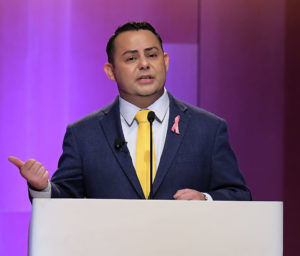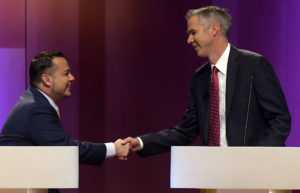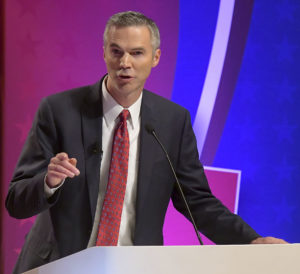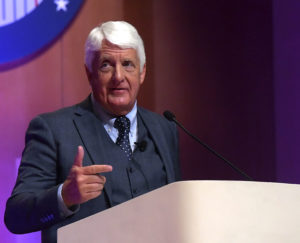Utah first congressional candidates debate at Utah State University
On Wednesday, three weeks before the midterm elections, candidates vying for the congressional seat in Utah’s first district debated public lands, the economy, immigration and other issues in the Caine Performance Hall on Utah State’s campus.
Rob Bishop, the incumbent, introduced himself as the only Republican and conservative candidate on the stage. Lee Castillo spoke as the Democratic nominee. Eric Eliason is running as a candidate from the United Utah party, a third party formed in 2017 that identifies itself as politically moderate.
 Eli Lucero (Herald Journal)
Eli Lucero (Herald Journal) Lee Castillo (D) speaks during UtahÕs 1st Congressional District Debate, on Wednesday, Oct. 17, 2018, at Utah State University in Logan.
Questions came from USU political science professor Michael Lyons, Student Advocate Vice President Sam Jackson, moderator Natalie Gochnour, associate dean of the David Eccles School of Business at the University of Utah and from the audience through the social media hashtag #usudebates.
Throughout the debate, both Eliason and Castillo criticized Bishop’s past actions in office, with Bishop emphasizing his experience and values will give him the “ability to be more effective in DC.”
 Eli Lucero (Herald Journal)
Eli Lucero (Herald Journal) Lee Castillo (D) , left, shakes hands with Eric Eliason (United Utah Party) after they took part in UtahÕs 1st Congressional District Debate, on Wednesday, Oct. 17, 2018, at Utah State University in Logan.
Lyons brought up the rising US deficit and asked candidates what they think the US should do about it.
Eliason said the president is notorious for debt and bankruptcy in his business practices and that in the current economy, “these should be surplus times.” Bishop answered the question with the same stance he used on several issues: “state and local governments should have more flexibility and creativity.” Castillo condemned the tax breaks the Trump administration recently gave to the wealthy saying, “the top one percent need to pay their fair share.”
Climate change was another hot topic, with the United Nations’ latest report warning of irreversible effects by 2030 if the rate of greenhouse gas emissions continues.
“There is not one cause and there is not one solution,” Bishop said. The Republican candidate mentioned carbon soil sequestration, the method of storing carbon dioxide underground, as an argument for grazing lands. Castillo expressed support for renewable energy and replacing the restrictions rolled back by the Environmental Protection Agency. Eliason placed an emphasis on water as “natural resource number one.”
Both Castillo and Eliason spoke about climate change as economic issues, pointing to local businesses and industries that would be negatively affected by unresolved environmental issues. Bishop said there’s a difference between climate change and the air quality issues Cache Valley faces, citing forest fires and ineffective land management as the cause for bad air quality.
The candidates also debated public lands, an issue they said is central to the state of Utah.
Eliason said Bishop cares more about reelection and money coming from oil and gas companies than protecting public lands.
“Follow the money,” Eliason said.
 Eli Lucero (Herald Journal)
Eli Lucero (Herald Journal) Eric Eliason (United Utah Party) speaks during UtahÕs 1st Congressional District Debate, on Wednesday, Oct. 17, 2018, at Utah State University in Logan.
Bishop stated Trump’s scale backs on Bears Ears and Grand Staircase was a compromise between local communities and former President Barack Obama, and that Eliason’s remarks were unfair.
“I do not sell my votes,” said Bishop. “I stand for principles. I stand for something and to say otherwise is unfair and untrue.”
Castillo argued public lands should be designated as they were under the Obama administration. Speaking about the indigenous communities that protested Trump’s order, Castillo said, “[Trump] has no right to say what’s sacred to them and what’s not.”
On immigration, Bishop said, “we must have control of the border” before addressing other immigration issues such as the Deferred Action for Childhood Arrivals program. Earlier this year, Bishop supported a bill that would have provided $25 billion for border security and a path to citizenship for DACA recipients, or “Dreamers.” The bill failed 121-301.
Castillo said Utah needs a representative that will “speak out against family separation,” calling Trump’s immigration policies “inhumane.” He also expressed support for a pathway to citizenship for “Dreamers,” as did Eliason.
Political division and hostility were brought up in a question by Jackson.
Eliason’s platform revolves around moderate politics and bipartisanship and he said division is the reason he chose to run as a United Utah candidate.
Castillo advocated for term limits in Congress, saying it’s time for Bishop to retire and “allow those fresh new ideas to come in.”
“We need to purge career politicians that are comfortable being paid by special interests,” Castillo said.
Bishop said, “Washington sucks, but it’s not nearly as bad as you hear all the time.” Bishop referenced the media as a source of division, saying news outlets prefer to report on conflict rather than politicians working across the aisle.
Each candidate closed with brief statements summarizing the main points of their platforms.
“I am running with you as my special interest,” Castillo said. “I will fight for Utahns of all colors and religions. I want to reiterate that I believe Utah is for everybody.”
Eliason said, “I believe that the measure of our country is how we overcome this politically divided nation. It’s time we see differences of opinion as strengths rather than weaknesses.”
Bishop said, if elected, this would be his last term.
 Eli Lucero (Herald Journal)
Eli Lucero (Herald Journal) Rep. Rob Bishop (R) speaks as he takes part in UtahÕs 1st Congressional District Debate, on Wednesday, Oct. 17, 2018, at Utah State University in Logan.
“I promised Washington wouldn’t change me and I kept that promise – with the exception of losing 70 pounds,” Bishop said. “But I’m still the same person. Our delegation has to work like a team, and you are voting for who will be a leader on that team.”
Utah voters can register to vote online until Oct. 30 and can register at the polls on election day. More information on the candidates and propositions can be found at vote.utah.gov.
naomiyokoward@aggiemail.usu.edu
@naomiyokoward

